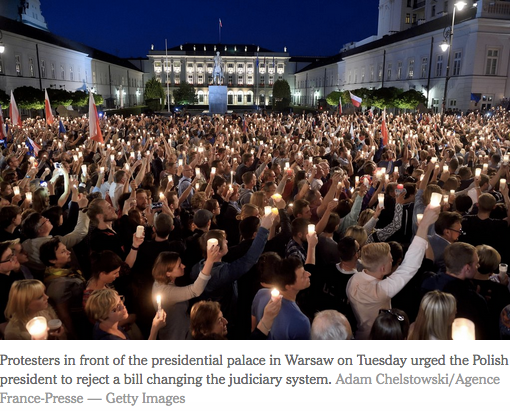WARSAW — Step by step, the Polish government has moved against democratic norms: It increased government control over the news media, cracked down on public gatherings and restricted the activities of nongovernmental organizations.
Now the party in power is moving aggressively to take control of the last major independent government institution, the courts, drawing crowds into the streets and possible condemnation by the European Union.
The party is pushing to jam several bills into law; one would force all the nation’s top judges to resign, except those it appointed. Another bill, already approved by Parliament, would ultimately give the government control over who can even be considered for a judgeship.
In Brussels on Wednesday, a top European Union official said that if the changes were made, Poland might slip outside the bloc’s definition of a democracy.
Polish Parliament Acts to Upend Nation’s Courts
WARSAW — Brushing aside warnings from the European Union and ignoring tens of thousands of protesters in the streets, Poland’s Parliament gave final approval to a landmark measure on Saturday that would restructure the Supreme Court, putting it under effective control of the governing party.
The new law was the latest in a series of acts from the Law and Justice party that critics say are aimed at curtailing the judiciary, the country’s last bastion of independence. If President Andrzej Duda signs the laws, as expected, Poland will take its largest step yet away from the West’s liberal values in a nation that was once a symbol of democracy’s triumph over communism.
Poland Pulls Back From the Brink, for Now
It took one of Jaroslaw Kaczynski’s accomplices in the ruling party he controls to put the brakes to his ruthless assault on Poland’s democracy. To general surprise, President Andrzej Duda, a former Law and Justice party backbencher loyal to Mr. Kaczynski, vetoed two bills that would have ended the judiciary’s independence and crippled the rule of law. That is heartening, but not the end of the problem.
Following two weeks of massive demonstrations, and after extensive consultations with legal scholars, historians, philosophers and others, Mr. Duda declared that while Poland did need judicial reforms, it must be “wise” ones, not proposals that would have the governing party appoint all judges. He said one discussion in particular had influenced his decision. It was with Zofia Romaszewska, a former Solidarity activist against the Communist state who told him she did not want to return to a time when courts followed the will of the country’s rulers.
Why Is Trump Silent on Poland?
The White House set the terms: Mr. Trump was to be met by cheering crowds, giving the world the impression of a strong American leader adored by foreign masses and their leaders. Conveniently, because the Three Seas Initiative summit meeting was taking place in Warsaw, Mr. Trump could meet with leaders from 11 other countries in the region in one fell swoop.
The visit worked for Mr. Kaczynski, too — embattled in Europe, his government needed to show that Poland enjoys the respect of one of the world’s most powerful politicians.
And so Mr. Trump came to Warsaw, confirmed his commitment to NATO’s Article 5 on collective defense, and promised contracts for the sale of Patriot missiles and natural gas to Poland. Mr. Kaczynski’s party bused in cheering crowds, and both sides concluded — with good reason — that the visit was a success.
. . .
In short, for the price of some applause, Mr. Trump gave Mr. Kaczynski the cover to carry out a coup. And what has the United States done since? The State Department issued a dry statement formulated not to offend the Polish authorities (“We urge all sides to ensure that any judicial reform does not violate Poland’s Constitution”).
Plan by Poland to Control Its Courts Draws a Rebuke, but Not Sanctions, From the E.U.
WARSAW — Two days after Poland’s president vetoed legislation that would have put the courts under the governing party’s control, the European Union filed a complaint against the government over the proposed changes.
The union, however, backed off its threat last week that it might invoke a never-before-used provision of the European Union treaty that could have resulted in a formal warning to Poland, economic sanctions and potentially a loss of voting rights in the bloc.
In response to the complaint, Poland’s right-wing government told Brussels to keep out of the country’s internal policies.
“We will not succumb to pressure, blackmail, threats and intimidation,” the justice minister, Zbigniew Ziobro, told reporters on Wednesday afternoon. “We will carry out this good reform in the judiciary, and no one will stop us. No threats will stand in our way. We won’t let anyone from the outside treat us this way.”
Frans Timmermans, the second-ranking official in the European Commission, the union’s administrative arm, said on Wednesday that the treaty provision, known as Article 7, could still be invoked if Poland pursued the vetoed moves on the courts.
The commission gave Poland a deadline of a month to respond to its concerns and said it would add this dispute to the list of other complaints it has with Warsaw, Mr. Timmermans said.




